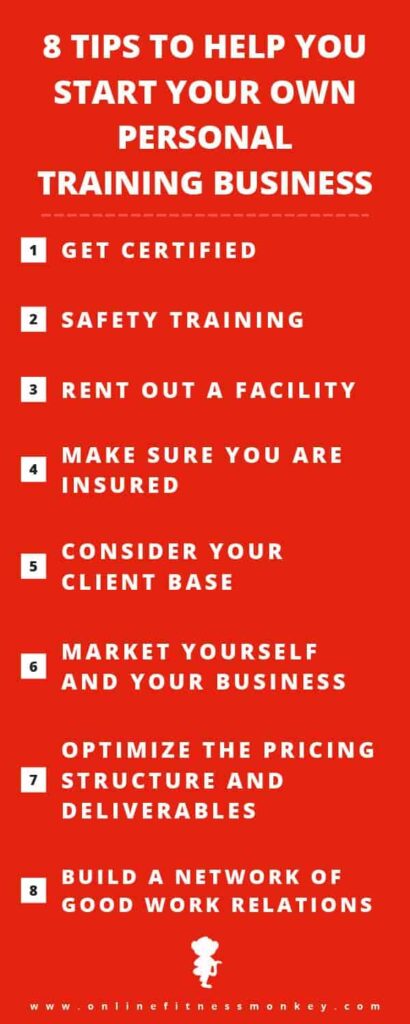Whether you just got certified and want to get started immediately, or you are still in school, but you want to plan for your business now, this helpful guide will give you the information you need to start your own personal training business.
To start your own personal training business, you will need to consider several things, such as location, target market, work philosophy, and market share. All these things will have an impact on your business model and the long-term success of the business.
The considerations listed above should be thought of as primary to your starting your business, but there are several other items that should be on your checklist. Keep reading to learn more about eight tips to help you start your own personal training business.
Article Contents
How Do I Start My Own Personal Training Business?
To start, you will need to figure out what your business model will look like. A business model is made of many factors and includes things like your personal focus as a professional, the target market you will be catering to, and the regulations governing your business.
We have compiled a list of 8 of the best tips to help you get started with a successful personal training business. Each tip is an integral step in becoming a personal trainer and developing your business model.
8 Tips to Start Your Own Personal Training Business
To start your own personal training business, you will need a roadmap to follow to stay on track. Here are eight tips you can use to guide you through the process:
- Get certified
- Safety training
- Rent out a facility
- Make sure you are insured
- Consider your client base
- Market yourself and your business
- Optimize the pricing structure and deliverables
- Build a network of good work relations
By following each tip, you will position yourself better when starting your own personal training business. Keep reading to learn more about these eight tips.
 Get Certified
Get Certified
The first thing you need to do is attain certification in the field of personal training that you wish to go into. There are several types of licensure you can get, and they all have different requirements, focuses, and advantages. Some are listed here:
- American Council on Exercise
- National Council on Strength and Fitness
- National Academy of Sports Medicine
These certifications all allow you to perform a basic level of personal training, coaching, and advice, but not all of them are equally rigorous or well respected, depending on what you plan to be offering your clients.
For example, the ACE certification has a lower minimum pass rate, which most clients are not likely to know, but it may matter. ISSA certification covers a wider range of topics and core concepts and provides education in fields such as kinesiology and nutrition science.
Safety Training
Whatever the type of clients you will be servicing, they will appreciate knowing that you have an appropriate level of training and familiarity with basic safety techniques. These include, but are not limited to CPR, First Aid, and defibrillator use.
It is important to note that many facilities within which you may decide to work require these training modules as standard practice before allowing you to train clients. Whether you will be completely independent or working at a facility, they are important to have.
Having an academic specialization like Sports medicine enhances the impressiveness of having these safety certifications, and an appropriate client base will appreciate this all the more.
Rent Out a Facility
Now that you have certifications and safety training in the appropriate areas, you need to decide where you will be seeing your clients. In the beginning, purchasing your own equipment and renting a facility can be prohibitively expensive, so you may want to consider getting hired on at a local gym as an independent contractor.
Advantages include:
- A maintained facility at which to work
- Brand visibility
- Equipment available to use
- Insurance is usually covered by the facility
The benefits of working as an independent trainer at a gym do certainly provide you with a lot of latitudes when it comes to start-up costs. However, remember that there are drawbacks as well. You have to give a percentage of your income to the owner, and you run the risk of becoming associated with that particular gym as opposed to your own business.
Make Sure You Are Insured
If you will not be working at a facility with its own property and liability insurance, you will need to procure that for yourself. It is not difficult, and it only takes a short amount of time. Considering what you risk without it, it is a must.
Getting insured with all the appropriate considerations for your business type is non-negotiable. Even if it is not required in your state, you should get insurance anyway. Besides, clients like to know that you have their best interests at heart, too.
Granted, it can be intimidating deciding how to insure yourself and committing to insurance premiums and monthly payments before you have an operable income, but do not worry; it will be well worth it when you do start seeing clients.
Clients also like to know that you carry insurance, not just for the peace of mind but for the professional connotations. Carrying insurance implies to them that you are serious about their safety and development.
Consider Your Client Base
Now that you have a place to work, you have to decide, if you have not already, what type(s) of clients you will be seeing. If your training and certifications are broad enough, you can effectively train a wide range of clients.
Rehabilitative training, for example, is much different than training competitive athletes; although you can diversify by offering both therapeutic training and other types of training for clients, you wish to coach through a range of physical development. Will you be seeing:
- Athletes
- Senior Citizens
- Sports Professionals
- Cross-Trainers
- Bodybuilders
You do not have to focus on a particular niche, per se, but in the beginning, it can be extremely helpful, especially if you want to get started as soon as possible. You can always diversify later as you acquire more experience and certifications.
The facility you choose to build or work in has a significant impact on what clients you can see. Not all facilities are geared toward the same people or the same needs, so making an appropriate decision in the selection of equipment will bring in the right clients.
Market Yourself and Your Business
This stage of developing your business is intimidating for many, but with a little drive and dedication, it will be the most rewarding and exciting part of the process. There are so many marketing avenues you can consider, and picking a course will depend on several factors.
You need to consider the people you are marketing to and what media outlet they are most likely to consume. Every target demographic is different and requires a different approach to reach maximum exposure.
Diversification of your advertising practices is important, but you should not waste energy on a marketing strategy that is not likely to reach your target market. For example, if you are marketing toward senior citizens, you will want to choose a different media type than that which would be appropriate for young athletes.
Media such as Facebook, Twitter, Instagram, and other social media are powerful tools you can use to develop a wide-reaching campaign but do not neglect other media types like television and door-to-door advertising, if appropriate.
Optimize the Pricing Structure and Deliverables
Clients want to know what you offer and how much they can expect to pay, and they want to see a clear, concise structure that is easy to understand. No one wants to feel confused or taken advantage of, and designing a pricing structure that helps your clients feel secure about what they are getting is a good goal to have.
Managing the expectation of your clients, especially working in an industry that involves body image and self-esteem, is absolutely essential at every stage of the journey you take with your clients.
From the beginning of your relationship with a client to when you give them their final session and beyond, helping them understand what to expect from the work they are putting into themselves and their training experience will pay off in the long run.
Build a Network of Good Work Relations
This last step not only applies to clients but to other industry professionals. Having a shining reputation is what will propel you from an unknown quantity to a respected expert. Not only this, but other professionals in your area will be much more likely to funnel business your way if you treat your peers and clients with respect.
Cultivating and sustaining good relationships involves many things, but remember these as your top priorities:
- Do not undercut the market.
- Empathize with clients
- Reach out to other business owners
- Be honest
It may be tempting in the beginning to price yourself below the competitive bracket, especially since you may start out with less than stellar confidence. But this is a mistake many new business owners make, so do your best to avoid it. Study the market and make sure you are fairly assessing what you offer.
Empathizing with your clients might sound like an obvious tactic, but it goes hand in hand with managing their expectations and delivering a quality product. If you make your clients feel as though you appreciate their position, they are more likely to succeed and give you better reviews as well.
Reaching out to veterans in the industry as well as those who, like you, are just starting out is a great way to develop good relationships and to build an understanding of the local markets. Not only this, but you get a better understanding of the competitive landscape as well.
Lastly, be honest. Being transparent about your business practices and your intentions is key to your success. Being abstruse or less-than-clear is not going to win you any friends in the industry or keep your clients around, so make sure you do your best to be forthright at every step of the way.
Summary
After obtaining your licenses and certifications, you will be set to decide what clients you want to see. From there, decide if you want to train at an established facility or start out on your own; business loans can help with start-up costs if you want to be completely independent.
Diversification with both clients and marketing will be important for developing a lasting reputation in and among the community. Or, if you have a niche, do everything you can to present it as the best option for the clients in that niche.
Lastly, do not underestimate the power of having a good reputation among your peers as well as your clients. Do not undercut your professional competition; even if you are tempted to, in the beginning, it never pays off in the long run, and people will not have a favorable opinion of your practices.




